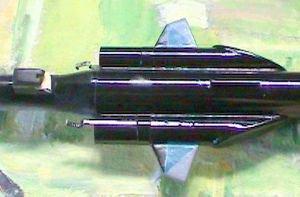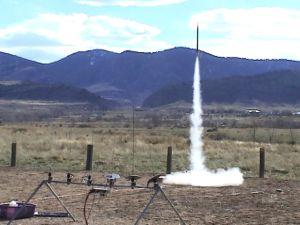| Manufacturer: | Estes  |

Brief:
This is a kit bash of two Estes Guardian kits into a clustered rocket with
ducted ejection and a parasite glider. The name is a little joke:
giardia are parasites.
Modifications:
PDF attached for the glider. I left mine naked. The front mount is a launch lug
from the kits, the rear mount is a piece of 1/2" x 1" balsa (see diagram on PDF file) glued
onto the rear BT-50.
The two side engine pods have an industrial look because the kit supplied motor mounts and mount retainers are attached externally. Cut portions of old engine casings function as both engine blocks and tube couplers for the 2.25" of BT-20 ejection chambers forward of the engine mounts. The chambers direct gases into the main BT-55 through 1.5" x 3/32" slots in the BT-20s and BT-55. Three thick fillets seal the slots nicely.
The main body is simple. It starts with the two main body tubes glued together with a coupler. The nose section is as designed in the kit except for 4 rather than 3 canards. The tail section is permanently glued into the body using CA, the main fin roots are contoured to the tail cone, glued with CA, and filleted with household cement or epoxy. It is important to make sure to position the fins so they don't get burned by exhaust. The shock cord is elastic with paper mount.
Construction:
Contains all parts from 2 Guardian kits except it uses 4 canards and 4 fins
while there are 6 of each provided in 2 kits. Two engine pod canards, which are
strictly for looks, were cut from the extra balsa. The paper engine mount
centering rings from the kits were not used. The only additional materials
required are: balsa for the glider (3/32" for the fuselage and front
attachment pin, a little 1/2" balsa for the rear attachment mount, and
1/16" for the wings), 4.5 inches of BT-20 for the ejection chambers, and a
BT-55 coupler. The ejection chambers use scrap balsa from the kits to direct
gases into the main body.

Finishing:
Giardian was painted with spray enamel in the Guardian paint scheme after prep
with high-build primer. The standard adhesive decals were slightly modified
with a hobby knife to turn the "U" into an "I".
Flight:
A8-3, A10-3T, and B4-4 motors worked fine and were retained with the supplied
clips. Prep is standard wadding and parachute, although you may not need
wadding. Better safe than sorry though. An 18" parachute is adequate. The
glider slides on from front to rear using both mounts and pops off at ejection.
 The wiring
for the cluster is a challenge: it has to be on one side to reduce chance of
snagging the micro clips. It's wired with soft, small gauge wires so the micro
clips are off to the side and swing away from the fins at ignition. A wooden
dowel is forced into the ground beside the launch pad to act as a scaffold. The
clip whip is fastened to the scaffold using a clamp-style paper clip.
The wiring
for the cluster is a challenge: it has to be on one side to reduce chance of
snagging the micro clips. It's wired with soft, small gauge wires so the micro
clips are off to the side and swing away from the fins at ignition. A wooden
dowel is forced into the ground beside the launch pad to act as a scaffold. The
clip whip is fastened to the scaffold using a clamp-style paper clip.
Summary:
Impresses the most jaded. Flights are very cool. Cluster wiring takes a while
to prep and extra care is required to keep from snagging the rocket on the pad.
 |
 |
Flights
Sponsored Ads
 |
 |











